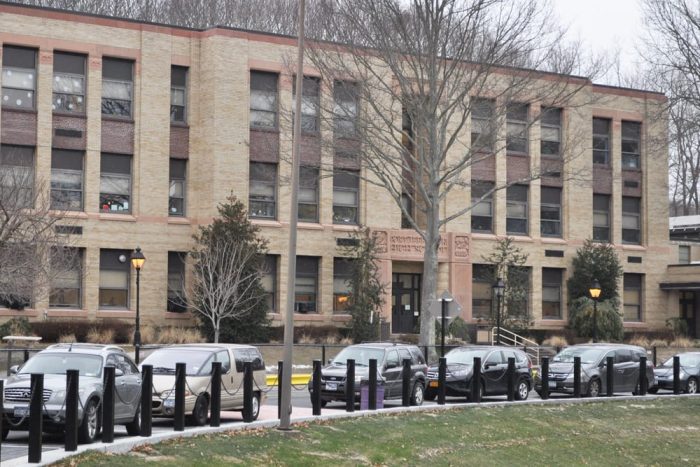PJSD facilities proposal defeated narrowly, turf field plan firmly rejected
In a public referendum held Monday, Dec. 12, Port Jefferson School District residents voted down two ballot measures totaling $25 million in school infrastructure improvements.
With nearly 1,000 district residents turning out in wintry weather, just 24 votes would separate the yeas and nays on Proposition 1, a $23.1 million infrastructure package that targeted various facilities throughout the school district. The measure failed by a narrow margin of 498-474. Proposition 2, a $1.9 million proposed artificial turf field at the high school, was defeated 734-239, a roughly 3-1 ratio against the measure.
In an email statement, district superintendent of schools, Jessica Schmettan, offered her commentary on the outcome.
“While the district is disappointed in the results of the Dec. 12 bond vote, we thank all who participated,” she said. “The small margin of defeat of Proposition 1 was particularly upsetting, as the challenges that exist with our aging building infrastructure remain a top concern for the district and, as such, will require further discussion for how best to proceed.”
Mayor Margot Garant, a PJSD alum, publicly supported both measures leading up to the referendum. In an interview, she also expressed disappointment at Monday’s results.
‘I think it’s very shortsighted by this community.’
— Margot Garant
“I don’t think that’s the Port Jeff way to let things get so deteriorated,” she said. “I think [the Board of Education] came up with a doable plan, and it was the time to do it because the community is still being subsidized by the LIPA power plant.”
The mayor added, “The schools are so important to this community. It’s what people look for when they come to live in Port Jeff. It’s one of the pillars that makes this place so special. … Just because you don’t have a child in the district doesn’t mean you shouldn’t be investing in this community.”
Leading up to the election, New York State Assemblyman Steve Englebright (D-Setauket), whose district encompasses Port Jefferson, supported the infrastructure upgrades within Proposition 1. In a phone interview, he referred to Monday’s school election outcome as part of a regional electoral trend and a “reflection of the post-pandemic moment.”
“The escalating cost of food and fuel have put a lot of people on edge,” he said. “I would guess that what we’re seeing is a reflection of the general anxieties about inflation.”
Though Englebright was sorry to learn that the voters defeated the facilities improvements, he was less amenable to the artificial turf proposal. He regarded the potential risks associated with synthetic turf as an unsettled science, with crumb rubber possibly having “some contamination issues,” along with added costs for maintenance and replacement. “It’s a very expensive proposition for those reasons,” he said.
Englebright was not alone in his reservations about the turf proposal. Paul Ryan, a former BOE candidate, was a vocal opponent of Proposition 2 in the months leading up to the vote. In an email statement, Ryan said Proposition 2 likely impacted the outcome of Proposition 1.
“I was disappointed but not surprised to learn that Prop 1 failed to garner enough community support,” he said. “I believe it failed because of the inclusion of Prop 2,” adding, “I suspected that enough of the residents would be upset by the turf that they [would] vote down the whole bond.”
Monday’s negative vote has prompted questions about the long-term prospects of the school district. For Garant, residents have an active stake in maintaining school facilities, which she said closely correspond to property values.
“Your home values are in direct correlation and are so connected to the value of the schools,” she said, adding, “I think it’s very shortsighted by this community. I’m disappointed, and I want to encourage the school board to continue their efforts, go back to the grind and maybe come back again.”
Some have advocated for PJSD to merge with a neighboring district due to its declining student enrollment in recent years. Garant regarded this idea as misguided, maintaining that support for the school district is in the village’s long-term interest.
“The miscommunication that’s going out there is that we can just merge with another district,” she said. “If we did that, our taxes would double immediately. I think that’s what people don’t really understand.”
Englebright noted the important place public schools occupy within the greater community. However, he suggested residents may need to take time for the broader economic trends to settle before taking on additional expenses.
“That school district has a long and distinguished history of service,” the assemblyman said. “People in Port Jefferson are rightly proud of their schools,” but adding, “I think that we have to give it a little time.”
Ryan again took on a different tone, insisting that future referenda within the district will require closer coordination with those supporting these projects financially.
“The administration and BOE need to demonstrate that they are able to hear the residents’ concerns, prioritize only essential infrastructure and take a fiscally responsible approach to spending,” he said. “If they do not, they may find annual budget votes contentious.”







